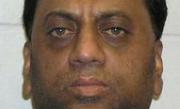Nearly six years have passed since U.S. authorities took the unusual step of rounding up a group of Sri Lankan immigrants and charging them with breaking terror financing laws by raising money and trying to get weapons for the Tamil Tigers rebel forces.
Since then, 14 defendants charged in New York have been convicted. Some were given 25 years in prison. Back home, the Tamil Tigers were finally vanquished after a bloody civil war.
But there’s still no finality to the criminal case.
After countless delays, one of five defendants left in legal limbo — a naturalized U.S. citizen and former cab driver named Karunakaran Kandasamy — is up for sentencing Friday in federal court in Brooklyn. Two others who also pleaded guilty are awaiting sentencing, while another pair is fighting extradition in Canada.
For the 55-year-old Kandasamy, the stakes are high: Prosecutors have argued that as the top U.S. representative for the Tamil Tigers, he deserves a lengthy sentence — the maximum is 20 years — for raising money for the separatist group. The defense believes Kandasamy, who suffers from diabetes and other ailments, already has done enough time.
Kandasamy, a native Tamil who’s been jailed for five years, “is a fundamentally good and decent man who wanted to help the community he clearly loved — a community that suffered terribly for many years,” defense attorney Charles Ross wrote in a recent letter to the judge.
“There is no question that Mr. Kandasamy went too far and broke the law, but like other defendants in this case, he was motivated by a deep desire to help his people,” the letter adds.
In 2009, the Tamil Tigers admitted defeat in their 25-year war with the Sri Lankan government that left more than 70,000 people dead.
The rebels, who once controlled a de facto state in the island nation’s north, had been fighting since 1983 for a separate state for minority Tamils after decades of oppression by the Sinhalese majority. Blamed for hundreds of suicide attacks, the Tamil Tigers were shunned internationally and branded terrorists by the U.S., European Union and India.
Federal authorities in New York had sought to cut off support for the group by arresting sympathizers in their East Coast immigrant communities in 2006 and 2007 on charges of conspiring to provide material aid to a terrorist organization. Some like Kandasamy were tied to a covert campaign to raise and launder millions of dollars through a charity front organization.
Prosecutors say there’s evidence Kandasamy helped raise millions of dollars for the Tamil Tigers, and that he went to Sri Lanka to meet with rebel commanders.
The defense argued in it recent letter that Kandasamy’s motives were humanitarian. It says in Sri Lanka, he “personally witnessed the brutality of the Sri Lankan government on many occasions. … For more than 25 year, he lived in constant fear for his life and safety and the lives and safety of his family, friends and neighbors.”
The U.S. government, “recognizing the systematic victimization of the Tamil people, granted Mr. Kandasamy political asylum in the early 1980s,” the letter adds. After that, “he lived an upstanding, law-abiding life.”
By TOM HAYS
AJC
